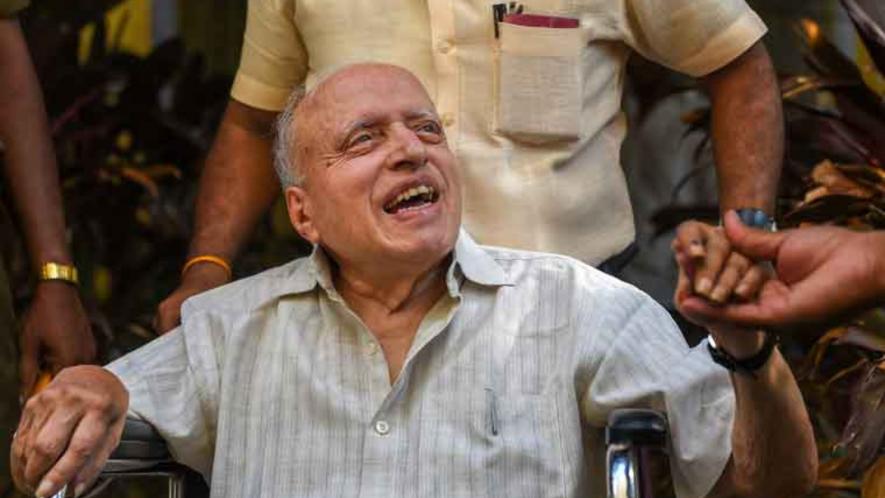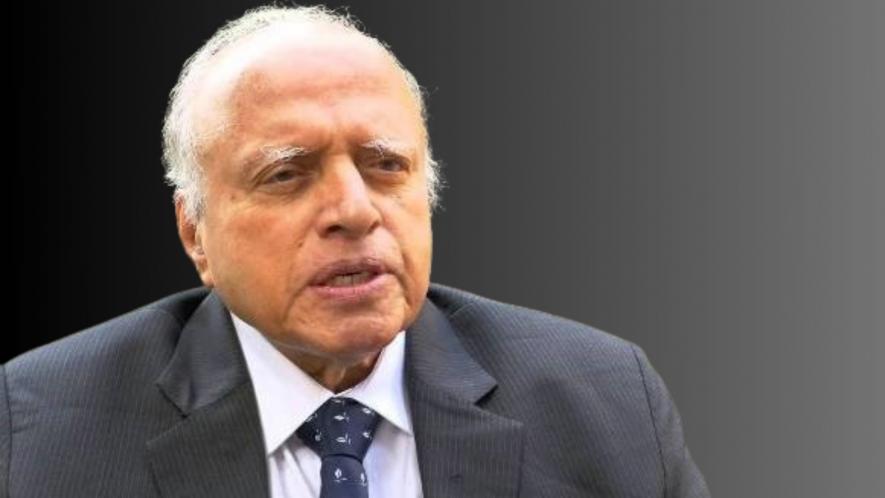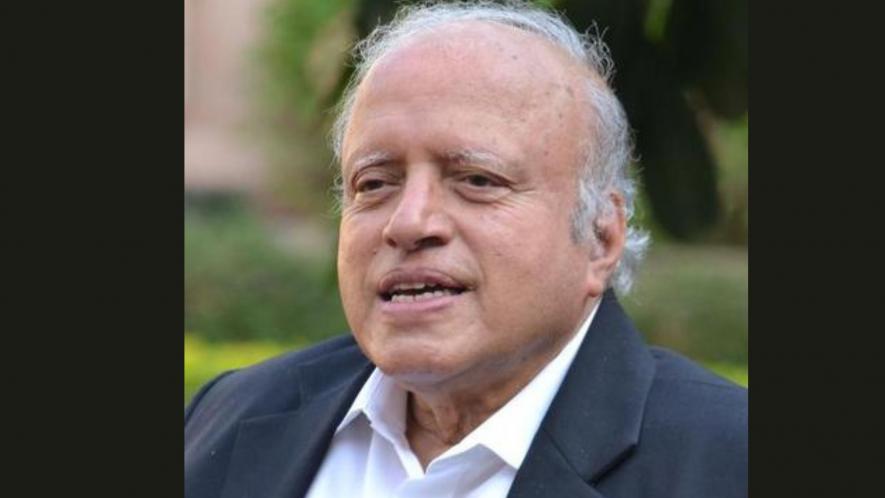Crusader for Converting Green Revolution to Evergreen Revolution

M.S. Swaminathan. Image Courtesy: PTI
MS Swaminathan, the Father of India’s Green Revolution, passed away at the age of 98 on Thursday. The internationally renowned agricultural scientist was conferred with several prestigious awards like the first World Food Prize—established by Nobel Peace Prize winner Norman Borlaug—Ramon Magsaysay Award and Padma Shri.
C Subramaniam Called for Agricultural Scientists
When Lal Bahadur Shastri became Prime Minister after Jawaharlal Nehru’s demise, no Congress leader being considered for ministerial berth was willing to become the agriculture minister.
Anyone holding that portfolio had the unenviable task of going around the world with a begging bowl for food grains to deal with India’s frightening level of food shortage and hunger.
C Subramaniam, the heavy industries minister in Nehru’s Cabinet, was given the agriculture portfolio by Shastri. In his autobiography, Subramaniam wrote that after taking oath as the agriculture minister, he convened a meeting of agricultural scientists from New Delhi’s Pusa Institute instead of meeting his ministry’s top bureaucrats.
One of the scientists was Swaminathan, who, along with others, apprised the minister that high-yielding varieties of seeds used in Mexican laboratories had the potential to transform the agricultural sector and augment food grain production.
That meeting was the turning point for Indian agriculture, which was transformed by the launch of the Green Revolution and the use of high-yielding seeds in Punjab, Haryana and Bihar. Later, President KR Narayanan conferred Bharat Ratna on Subramanium for his contribution to the Green Revolution.
India’s Food Grains Self-Sufficiency ‘More Important’ Than Apollo 15
While Borlaug is credited with developing Mexican dwarfs (the high-yielding variety of wheat and rice seeds), which ushered in the global Green Revolution, Swaminathan was the crusader of that revolution in India.
Swaminathan’s historical initiative made India self-sufficient in food grain production in 1971, ending the ignominy that the country was living from ship to mouth. It happened during the first tenure of Indira Gandhi, who unilaterally terminated the PL480 agreement with the USA based on which India got wheat and rice to meet its massive food shortage.
India’s self-sufficiency in food grain production in 1971 was described by Swaminathan as more remarkable than the man walking on the Moon in 1971.
World-renowned demographer Thomas Malthus had predicted that India would become a victim of unprecedented starvation causing millions of deaths because of severe food shortage. While Borlaug, in his Nobel prize acceptance speech, acknowledged India’s exemplary role in spearheading the Green Revolution.
Borlaug later commended Swaminathan and wrote: “To you, Dr. Swaminathan, a great deal of the credit must go for first recognising the potential value of the Mexican dwarfs. Had this not occurred, it is quite possible that there would not have been a Green Revolution in Asia.”
While mourning his sad demise, it is critically relevant to recall Swaminathan’s legacy, which represented his quest for transforming the Green Revolution into an ‘Evergreen Revolution’. He did so by stressing that an ‘Evergreen Revolution’ would be the outcome of a persistent practice of methods that would lead to sustainable agriculture by eschewing some habits such as the use of too much fertilisers and water associated with the Green Revolution.
Those articulations corresponded to Borlaug’s prescription in his Nobel prize acceptance speech that fertilisers should be used like human use medicines to deal with illness and ailment and recover from diseases.
From Green Revolution to Ever Green Revolution
Swaminathan explained the attributes of an Evergreen Revolution in his 2010 book From Green To Evergreen Revolution and wrote that water conservation, genetically diverse crops and energy-reducing methods would make agriculture ecologically safer and help small farmers immensely.
“Land and water management”, Swaminathan, wrote, “should be given ‘number one’ priority for achieving evergreen revolution,” He then cautioned: “If agriculture goes wrong, nothing else will have a chance to go right in our country.”
These profound words assume greater significance in the context of crises confronted by the agricultural sector, which is witnessing tragic suicides by farmers, who find agriculture an unprofitable profession.
In his address to Parliament in November 2010, then-US President Barack Obama stressed the idea of an Evergreen Revolution as a remedy to climate change.
Swaminathan said that the Green Revolution should be pro-nature, pro-poor and pro-women.
When Narayanan conferred the prestigious Indira Gandhi Award for Peace, Disarmament and Development on Swaminathan, he invoked his idea of an Evergreen Revolution—the idea is now gaining traction globally.
National Commission on Farmers and MSP Legacy
The Manmohan Singh government selected Swaminathan to lead the first National Commission on Farmers. The Commission’s monumental report, while recommending measures for attracting the youth towards agriculture and making it a more profitable profession, pleaded for a Minimum Support Price (MSP) for crops which should, at least, be 50% more than the weighted cost of production.
Now, MSP is the oft-quoted demand of farmers across India. Many political parties demand the implementation of the report and the “Swaminathan formula” for MSP for all crops.
Swaminathan’s name has become very familiar in farmers’ protests and political agitations in the defence of the farming community. His legacy will endure to transform the Green Revolution into an Evergreen Revolution.
The writer served as the officer on special duty to President KR Narayanan. The views are personal.
Renowned Agricultural Scientist M S Swaminathan Passes Away

Chennai: M S Swaminathan, renowned agricultural scientist and the driving force behind the nation's 'Green Revolution, passed away here on Thursday.
He was 98 and is survived by three daughters, including Dr Soumya Swaminathan, the former chief scientist of the World Health Organisation.
The celebrated agriculture icon, who was being treated for age-related illness for quite some time, passed away today at 11.15 AM at his residence here.
Condolences poured in with Prime Minister Narendra Modi hailing Swaminathan saying his groundbreaking work transformed lives of millions, ensured India's food security.
Indian Agricultural Research Institute Director A K Singh said an era of agricultural research, education and extension marked by disruptive innovations has come to an end with the death of Swaminathan.
Tamil Nadu Governor R N Ravi, Chief Minister M K Stalin, leaders of farmers' bodies including P R Pandian condoled Swaminathan's death.
The Congress party described him as the key scientific architect of the Green Revolution and hailed his contribution to the agriculture sector.
Modi said on X: "Deeply saddened by the demise of Dr MS Swaminathan Ji. At a very critical period in our nation's history, his groundbreaking work in agriculture transformed the lives of millions and ensured food security for our nation."
Beyond his revolutionary contributions to agriculture, Dr Swaminathan was a powerhouse of innovation and a nurturing mentor to many. His unwavering commitment to research and mentorship has left an indelible mark on countless scientists and innovators.
"I will always cherish my conversations with Dr Swaminathan. His passion to see India progress was exemplary. His life and work will inspire generations to come. Condolences to his family and admirers. Om Shanti," he said.
Former Prime Minister H D Deve Gowda expressed grief over the demise of Swaminathan and said he was greatly benefited from his advice on many occasions.
Swaminathan, who founded the MS Swaminathan Research Foundation here, has been described by the United Nations Environment Programme as "the Father of Economic Ecology” acknowledging his leadership of the green revolution movement.
Singh said: "In passing away of Prof. Swaminathan, ends an era of agricultural research, education and extension that was full of disruptive innovation. If God appears to poor and hungry in form of bread as said by Mahatma Gandhi, that God is Dr. Swaminathan who should be worshipped by every citizen while taking daily meals."
Congress general secretary Jairam Ramesh said Swaminathan made India self-sufficient in rice and wheat by the mid-70s.
He has received 84 honorary doctorate degrees from universities around the world. He is a Fellow of many of the leading scientific academies, including the Royal Society of London and the U S National Academy of Sciences.
AICC general secretary K C Venugopal said he was deeply saddened to hear about the demise of Swaminathan.
"His contribution to Indian agriculture transformed the lives of millions. We are committed to take his vision forward every opportunity we get," he said.
Karanataka Chief Minister Siddaramaiah expressed grief and said his contribution to India's agricultural progress and economy is immense.
Farmer leader Rakesh Tikait said India will always remember the positive changes that Swaminathan brought to the country's agriculture and farmers and his contribution to food security.
Swaminathan was a part of every key initiative connected to food security and agriculture, and his stellar contributions are pioneering, including the focus on millet for nutrition security as well.
He was a former Rajya Sabha member (2007-13).
Javier Perez de Cuellar, former Secretary General of the United Nations, said as "a living legend who will go into the annals of history as a world scientist of rare distinction”.
Nation Mourns M S Swaminathan, Architect of Green Revolution

MS Swaminathan. Image Courtesy: Twitter/@msswaminathan
Delhi: M S Swaminathan, the eminent agricultural scientist, and unwavering crusader against hunger, breathed his last on Thursday at the age of 98.
Profoundly committed to the cause of food and nutrition security, his pioneering efforts played a pivotal role in averting famine during the tumultuous 1960s. A distinguished recipient of the Padma Vibhushan and the inaugural World Food Prize, he spearheaded India's green revolution, earning recognition through an array of national and international accolades, including the esteemed Ramon Magsaysay award.
The All India Democratic Women’s Association (AIDWA) paid tribute to the late Prof M. S. Swaminathan, the visionary behind the Green Revolution and former Director General of the Indian Council of Agricultural Research.
In a statement, AIDWA noted that Prof Swaminathan's lifelong dedication to public policy for food security and the welfare of farmers and agricultural workers has left an indelible mark. AIDWA recognised his commitment to acknowledging the pivotal role of women farmers in various sectors.
"Swaminathan’s lifelong work acknowledged the pivotal role of women farmers in agricultural and allied sectors like animal husbandry, forestry, fisheries, etc. The MS Swaminathan Commission Report on Farmers Welfare had a special section on the role of women in agriculture," the women's organisation said.
In his death, the democratic movements and the women’s organisations have lost a great advocate for the legitimate rights of the peasants and working people, it said.
He leaves behind a lasting legacy and a family, including his three daughters, one of whom is Dr Soumya Swaminathan, former chief scientist of the World Health Organisation.
Condolences poured in from political and intellectual quarters. President Droupadi Murmu and Prime Minister Narendra Modi hailed Swaminathan's yeoman service to the nation. Murmu said Swaminathan left behind a rich legacy which would serve as a "guiding light to steer the world towards a safer and hunger-free future for humanity". PM Modi said his groundbreaking work transformed lives of millions, ensured India's food security.
The Congress party described him as the key scientific architect of the Green Revolution and hailed his contribution to the agriculture sector.
Former Congress president Rahul Gandhi said Swaminathan's steadfast commitment to revolutionising India's agriculture turned it into a food surplus country. Congress president Mallikarjun Kharge said Swaminthan was the key architect of India's Green Revolution.
Tamil Nadu Governor R N Ravi, Chief Minister M K Stalin, leaders of farmers' bodies including P R Pandian condoled Swaminathan's death.
Tamil Nadu CM Stalin said: "Deeply saddened to hear the passing away of eminent agro scientist Thiru M S Swaminathan. His pioneering work in the field of sustainable food security has had a profound impact worldwide."
Farmer leader Rakesh Tikait said India will always remember the positive changes that Swaminathan brought to the country's agriculture and farmers, and his contribution to food security.
Former Prime Minister H D Deve Gowda expressed grief over the demise of Swaminathan and said he was greatly benefited from his advice on many occasions.
Karanataka Chief Minister Siddaramaiah expressed grief and said his contribution to India's agricultural progress and economy is immense.
Delhi Chief Minister Arvind Kejriwal said Dr Swaminathan's "insurmountable" work in agriculture made India self-sufficient and "saved millions from food insecurity".
In his condolence message posted on X, Union food minister Piyush Goyal said, "Deeply saddened by the demise of Dr MS Swaminathan ji, the father of India's Green Revolution."
Indian Agricultural Research Institute Director A K Singh said an era of agricultural research, education and extension marked by disruptive innovations has come to an end with the death of Swaminathan.
“All of us have benefited immensely, directly or indirectly, from his vast contributions over the years. Without the Green Revolution in India, which he spearheaded, we would not have achieved food security,” agriculturist Ranjitha Puskar, country representative for India and research at the Manila-headquartered International Rice Research Institute (IRRI), told PTI.
She said his death was a tremendous loss to the scientific community in general and the agriculture fraternity in particular. “He was the director general of IRRI and his legacy has guided the organisation and its researchers to this day," Puskar added.
“He truly revolutionised Indian agriculture, worked towards self-sufficiency in food production when India was grappling with the threat of food insecurity and transformed India from a net importer of food grains to being a lead exporter to the global food basket. He was always looking for solutions for sustainable farming and improving the lives of the farmers,” Pradhan, research coordinator, International Food Policy Research Institute (IFPRI) South Asia region, told PTI.
(With PTI Inputs)
No comments:
Post a Comment